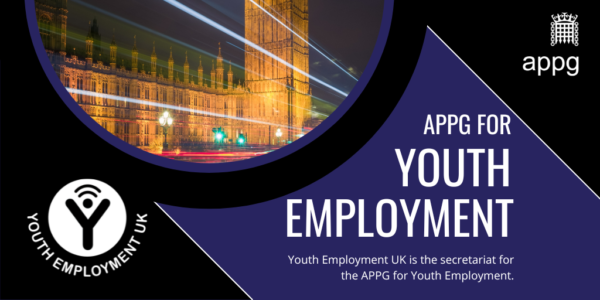On the 28th of March 2023, the APPG for Youth Employment held its first meeting of its new inquiry exploring place based approaches to youth unemployment.
The session was held in the House of Commons, attended by the Chair for the APPG for Youth Employment Shaun Bailey MP and a number of stakeholders and sector experts.
The session heard key evidence from two expert speakers on youth employment and heard testimony from two young people sharing their own experience of place based disadvantage and the impacts this had on their access to opportunities.
LJ Rawlings, CEO, Youth Employment UK
LJ Rawlings shared findings from Youth Employment UK’s Youth Voice Census 2022, a national survey of over 4,000 young people, highlighting that whilst some challenges facing young people entering the labour market were consistent at a national level there were clear nuances and differences for young people based on where they lived.
The inquiry head the key findings of the Youth Voice Census:
- Young people are in a mental health emergency
- Young people feel that difference is a disadvantage
- Young people are feeling unprepared for the world of work
- Young people are not confidence that they will find good quality work locally
Each of these findings represent national concerns of young people, however, where a young person lives means different experiences and different levels of access to support.
The inquiry heard that young people were concerned about their safety in their local areas, however the reasons for this varied depending on location, with young people in larger cities predominantly worried about knife crime whilst those living in coastal areas expressed greater worries about drug use.
The Youth Voice Census was supplemented with a number of in-person sessions in different regions across the UK. The inquiry heard that young people’s perceptions of the opportunities available to them and their aspirations for the future were impacted by their sense of place, what they could see around them and the services they were able to access.
LJ Rawlings concluded the evidence by reflecting, “We have to meet young people where they are now.”
Dr Tom Kerridge, Policy and Research Manager, Centrepoint UK
Dr. Kerridge shared the work that Centrepoint is doing to support vulnerable young people with experiences of homelessness across the country, providing tailored support to help them address their health, learning and employment needs.
The inquiry heard that the cohorts of young people that Centrepoint support are often highly vulnerable – having multiple, complex needs and coming from backgrounds in the care system and homelessness. This means that these young people regularly have turbulent experiences of education and limited access to employment opportunities. Centrepoint staff, therefore, work with young people to ensure that they receive appropriate education and training experiences, as well as opportunities to access work when possible.
Centrepoint is able to deliver services that respond to the challenges of local areas by understanding the cohorts accessing support and responding to their needs.
Dr Kerridge shared examples of programmes working at a place based level to address youth unemployment. Centrepoint’s “Get set, go” programme, provides young people with 3 weeks of learning the skills needed to successfully take on jobs in a sector. This programme is devised in partnership with local and national employers and enables young people to get relevant qualifications and work experience related to a specific industry.
As part of this, an employer will come into the service and talk about the industry, providing young people with a practical understanding of what it is like and an opportunity to appreciate that a job in the industry is possible. T
At the end of the programme, all successful participants will have a minimum of a reference from a relevant employer or a guaranteed interview if a suitable vacancy is available. In Centrepoint’s services in the North East, this model has recently enabled 24 young people to get roles in the construction industry, and staff state that this model works because young people see it as both manageable – lasting only 3 weeks – and a type of opportunity that provides progression into paid employment.
Youth Voice Perspective
The inquiry also heard testimony from two Youth Employment UK Ambassadors, Eden and Aniyah. Eilish Peters, Policy and Youth Voice Coordinator, at Youth Employment UK shared the contributions from the Youth Ambassadors with the meeting.
Eden shared with the inquiry that access to work experience where she lived had been a barrier for her and her peers in accessing opportunities. In particular, Eden was concerned that where she lived limited the type of work and industry sectors she would be able to access. Eden has an interest in publishing and needed to access online work experience to be able to gain experience in this industry as there were no similar opportunities available to her locally for in-person work experience. There was a concern that not all young people would be able to access similar virtual work experience and therefore have limited opportunities because of where they lived.
Eden also shared that there were few apprenticeship opportunities available where she lived which could limit the choices a young person is able to make about their future. There was also a sense that whilst there are opportunities for employment locally these are limited to certain sectors, in particular to social care and hospitality. Therefore the choices a young person is able to make about their future career paths and the opportunities that are available to them are often limited due to the types of work and industry sectors that are available in their local areas.
The inquiry also heard from Aniyah who shared with the inquiry her concerns that where a young person lives can lead to negative stereotyping of young people which can limit their employment opportunities. Aniyah shared that in London, postcodes can show insight into a young person’s socio-economic background which can lead to negative stereotyping and discrimination. Aniyah has experienced this first hand as employers had taken advantage of her as they perceived she would not understand her employment rights and would not have access to support networks because of her background and where she lived.
Further Inquiry Information
For further details on the inquiry and to access a full inquiry briefing, including how to submit evidence, please access the inquiry launch page.
Key Dates
Second Inquiry Meeting – Sign up here
25th April 16:30-18:00 – House of Commons
Deadline for written submissions
5th May 2023 at 5pm.
Report Launch
27th June 16:30-18:00 – House of Commons












